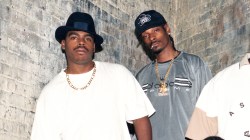In his five years of releasing albums, Guilty Simpson has done full projects with elite producers that most emcees would be satisfied with mere crumbs off the table. 2007’s Ode To The Ghetto debut was originally intended to be in tandem with J Dilla, though fate had its own plans. In turn, Madlib and Mr. Porter helped finish the job in one of the best audio testaments to the Detroit/Los Angeles connection. Madlib kept it going, and worked with Guilty on the O.J. Simpson follow-up. Last year, the Random Axe trio choreographed their street circus by Black Milk’s Hip Hop symphony. For his latest, Guilty lines up with a Michigan producer in Apollo Brown, who despite having a lower profile than the others, deserves the recognition as one of the best. Dice Game carefully plays the odds in some places, but it ends up banking on a Detroit ambiance to deliver one of Guilty and Apollo’s best works to date.
Guilty Simpson’s rapping has always been straightforward. He has a boisterous voice and brings the same flow to most of the songs throughout his career. However, his ability to seemingly sound good over any beat and rock over a plethora have styles have made the veteran so accessible to musical craftsmen. Where Simpson’s strengths are, besides his voice, are his images and his sincerity. Met with concept, those elements drive the lyrical half of Dice Game. “How Will I Go” is the album-closer, asking the question of when death will occur. In postulating the answer, Guilty lays out his life for all to see, and charts his growth despite strong ties to a seedy past. Apollo Brown seemingly rearranges a church organ composition and shines his sound through Guilty’s stained-glass writings for a captivating moment. “Reputation” captures the angst and mystique of Detroit. Guilty’s lyrics which chronicle crime and unemployment, also give reason to why the music industry sidesteps these messages in fear, to represent Michigan Hip Hop in a way that its own people may not so easily relate to. Apollo re-circulates a Motown Records sample famously heard on powerful records by Jay-Z, Fat Joe and firstly, Biz Markie. The way the producer flips the groove for the chorus breathes new life into the tradition, and makes for one of the most complete Guilty Simpson solo songs in his catalogue. Away from high concept, Guilty can just bust bars – and really well. “Nasty,” with Planet Asia, is just “I’ll steal your girlfriend” Rap music, but done really, really well. Dice Game has Guilty Simpson’s discography stackin’ chips.
Apollo Brown has released about as many albums in the last three years, as 9th Wonder seemed to from 2003 to 2006. The same pros and cons: a producer who you want to hear, but with a fully-saturated place in Hip Hop. Dice Game speaks to that criticism nicely. The big brassy beats and choral samples that made The Left’s Gas Mask and Daily Bread so alluring return, along with some more subdued compositions that let O.C. shine so brightly on this year’s Trophies. Dice Game is a full-course meal and sonically matches Guilty Simpson’s tone and message at every turn. Just as he has throughout the last three years, Apollo often employs some really notable and seminal samples into his compositions. As with “Reputation” or a Shaolin staple on “Let’s Play,” it’s not uncommon to hear the producer channel his inspirations, but he always adds to the recipe. Moreover, Apollo is finding a knock in his beats that is truly unique. A mix of repition with some sounds and that booming brass, and one can understand why Mello Music Group is an indie label built mostly around production. In the lineage of Dilla, Madlib and Black Milk, Apollo Brown’s work with Guilty Simpson is distinct and just as distinguished.
Like its title and theme, Dice Game lives in the alley beside the club. It’s for those in the know, and want an album that sounds great on the go. Guilty Simpson doesn’t attempt any lyrical acrobatics, but rather pulls up a chair with a drink, and tells stories about his life, about his city and about the things he likes. It’s simple, but it’s highly effective. For the second time this year, Apollo Brown teams up with a veteran emcee associated with great production, and he thrives. Whether just for the sake of the sport or a greater musical marriage, Simpson & Brown (let’s hope that’s not a future title) both put some money and accolades in their pocket after this intersection gamble.
![Method Man Admits He Didn't Like Drake's "Wu-Tang Forever": "I [Wasn't] Getting On That"](https://hiphopdx.com/wp-content/uploads/2025/12/method-man-drake-wu-tang-forever-remix.jpg?w=250)








![50 Cent Shares Unseen Diddy Footage From Netflix Documentary: "[It] Shows You His Character"](https://hiphopdx.com/wp-content/uploads/2025/12/50-cent-diddy-documentary-trailer-unseen-footage.jpg?w=250)

Spot on.
Ok good review but it should have been at the least a 4.5 Kendrick Lamar is not better than this, sorry!
You’re delierious.
lamar is trash!!!
haha you should apologize, all the rappers out there fucking up the game and you wanna hate on Kendrick? I mean, there’s plenty missing from rap and this guilty album is dope but you gotta be smoking rocks think this is a better overall comp than good kid. Kendrick’s craft and lyrics destory this. Still probably 2 or 3 best of the year though, apollo brown killing the boards
sick album and beats are fire.
Yeah this is way better than KL. Dude is weak! DICE GAME IS A CLASSIC!!!!!
This album is FIRE, period. The only other album touching this one this year is Trophies, another Apollo Brown album. He said he’s not trying to reinvent the wheel, it’s about preservation. I agree, and I’m enjoying it. Top 3 album of 2012, easily.
dope write up about my fam! but it should of got a 5!
Flawless. 5 stars. A win for the grimy
Detroit’s Album of The Year! This sh&t bangs front to back. Apollo and Guilty both beastin’ on here. Major props.
Dope dope record right chea. Apollo is the fucking man on the boards.
Rza, Dr.Dre, Just Blaze, Buckwild, Marley Marl, Kanye West, Easy Mo Bee, Havoc, Timbaland, Scott Storch… and you dont know who APOLLO BROWN is????? Go and listen to this masterpiece!
GUILTY SIMPSON THE MIC RULER PAINT THAT SHIT GOLD!!!
DONT MISS !
trophies is a 4.5/5. dice game is a 3.5/5 and no more. beats are better on trophies and o.c,’s lyrical ability and content is way more stimulating. This album is nice but Guilts lyrics are seriously lacking on half he tracks, weak multi’s if any, slow boring delivery and super basic concepts. His vocabulary is too limited. Some of these beats are lacking and too repetitive. yeah the production sound is raw and dusty which is nice, but appollo isnt adding anything on top of he main soul loops. he chops nice and that provides a dope asthetic but he aint adding any change ups or different sounds or doing much programming beyond the chopping of the main sample which are repeated without enough if any change ups. Some of the choruses are just plain lazy, weak and even corny like “lets play” and ‘the cook up”. On top of all that the guest appearences are alright but underwhelming. Album would have been more interesting if they collaborated with more rappers on this and some more stimulating ones. not sure how i feel about guilt holding down a whole album. bought it last week and only half the tracks remain on the ipod. this album aint a 4 like Sean prices Mic tyson! please. the ratings here are too general. His first album with Madlib is way better than this.
i was overly critical about this album. the shit is nice. guilty has that voice and style even though he’s not a lyrical monster. nice for a change. dope how at times how he purposely deviates from the basic rhyme scheme and dosn’t rhyme. beats are a bit repetitive but are too nice for that to really matter. i upgrade this to a 4/5. man enough to admit i jumped the gun. ha ha.
okay after 3rd listen i rate this shit 5/5. aoty… shit prolly greatest album ever! guilty is the best rapper of all time and apollo brown is the greatest producer alive.
Dark Boom Bap drums, hard rhymes; CLASSIC MATERIAL.
Every Apollo Brown album is a classic. Guilty is dope on entire album. This is the best Simpson album ever. Planet Asia joint was crazy, too.
This is a Great HIP HOP. One of the greatest albums of 2012. Maybe the greatest. Album deserves 4,5/5 easily.
Correction:
…
This is a great HIP HOP album*.
…
…
*This is a great HIP HOP *album*.
…
Great album!!
this is the best ive ever heard guilty simpson. he really impressed here. the way he wrote his story on “Truth be Told” was absolutely incredible. he commands the attention of the listener start to finish. and the beats were excellent. great album. apollo brown is a machine. incredible work fellas. curious to see where both artists go from here.
Apollo has been my favorite new producer for some time now.
This site gives out way too many 4’s – its getting annoying..
so bad !!
better than trophies…
apollo brown is a boom bap master…
top 10 of the year…
LIG
TROPHIES
GKMC
TOP 3 ’12
I think people are gonna look back at this album and wonder “How the Hell did I miss this?”
I’ve run this album back 3 times already and honestly can’t find any flaws. Just a raw, dope ass album. That fact that it’s damn near featureless (only 2) is another plus. Detroit you’ve done well.
This is all I been playing as of lately! Pretty f*cking solid I must say, that is all, now back to listening to more Dice Game (as I have been since the cd’s been in my hands…)!
GREAT ALBUM!
ANOTHA ONE IN’12
Apollo Brown is quietly having one of the greaest years in hip hop. He’s so slept on, but puts on great song after great song. He and Simpson are a great fit. If you haven’t listened to Trophies (Apollo and O.C.) do that right now. One of the best of the years.
This is solid. Sure it will grow on me
Dope album.
Polished rhymes by a raw lyricist and soulful and haunted sonic backdrops supplied by the world’s best producer, APOLLO BROWN. Album of the fucking year.
Dope Album. Dope Review. Thanks!
GREATNESS!
CLASSIC! DICE GAME!!
NAH THIS IS 5 STARS RIGH HERE THIS IS REAL HIP-HOP
DOPE
hip hop? maybe if you are 50+ years old. irrelevant ass niggas. Where is my 2 Chainz disc? swag
This comment was removed for violating our spam and/or offensive content policies. swag
they should block all this guys comments he’s a fuckin tard
Good album, not the best. I hate the fact Apollo jacked so much samples..
fire !!!
First of all, it’s a decent album, but imo the “Trophies” Album was much better than this one. Okay, Apollo Brown surely is amongst my favorite producers.
But… is it just me or does he get a bit repetitive, on the use of the elements? Alright, you can say it’s his trademark sound, (like Premo or Pete Rock) but i can guess i heard some similar stuff on his past few projects. (and i checked out most of his projects of the past 3 Years).
In addition, i can’t really dig Guilty’s flow and delivery. To me he is just a mediocre MC. Just listen to some Nas, Skyzoo or (old) Method Man Stuff and afterwards to a Guilty Simpson Album
… do you still think he’s an excellent lyricist? Even though Apollo hasn’t brought his A-Game to this album, he clearly outshines Guilty Simpson with his beats.
Okay i’m just a white greek guy and don’t know anything about the hood, but i listen to a lot of underground stuff, so i did my homework.
That being said, i’ll get back on my Rock Marci Trip, peace out.
it’s the drums man. i’m an apollo fan but once you notice you can’t not notice it. he literally uses the same drum pattern on 95% of his tracks. don’t believe me? listen to clouds, trophies, dice game…
it’s cause the whole albums mostly him and guilty on every track. All one producer/emcee albums are like that. it’s dope
as hell though. this and roc marciano=reloaded are my shit right now
yeah the drums are nearly always the same. but besides that i heard some samples he used on earlier projects. Anyway, i’ll listen to it, just because of the beats. It’s much better than 75% of the bs released nowadays, labeled as “Hip Hop”.
P.S.: Yes indeed, that Roc Marci Shit is the shit! 🙂
GTFOH KING LEONIDAS
MENTION NAS IN THE SAME BREATH AS…
AND THIS ALBUM IS GREAT!!!
Stuck on re-play! One of the best albums of the year!
More people commented on this review than bought this album.
I really like this album, but I think Apollo helped and hurt the album with his production. I heard trophies before this and after listening to this more than half the beats are recycled from trophies but a change here and there. I don’t know much about Apollo beside these two albums but I would not but him in the same class as alchemist,neptunes,wonder. His shit is to repetitive, no switch up. Having said that I still like his beats. Guilty did a good job. I give it a 4 but would have been better with fresher beats we haven’t heard..
You’re retarded – there are ZERO beats from Trophies. If you can’t even listen to the records then don’t comment.
OK fucktard, you obviously did not listen to Trophies cause if so you would know what I’m talking about idiot. And I never said I can’t listen to the album, I like it. Get off my nuts man!
Love Apollo Brown. With that being said….his beats are all starting to sound the same. And not in a “signature sound” kind of way. I mean THE SAME!!!!
Tasty.
Incredible album
One of the best albums of the year
Great album
Excellent
the best album this year
One of the best Apollo Brown collaboration After O.C.’s album produced by Apollo himself. Much Respect
I understand everyone gripes. Guilty is a dope MC who can flow on pretty much any beat but I agree, he’s not the best lyricist. As for AB, a couple of my friends who are into making beats say the same about dudes drum pattern. Personally, I love this album. The 1 MC, 1 producer albums are winning this year! In a battle over this vs Trophies I would take OC by a hair. In the end, instead of trying to find something wrong with this album, just let it breathe and enjoy some good, quality hip-hop. A very solid 4 out of 5 for me. and my top 5 most listened to albums this year.
This is the album I’ve been waiting for!
Brilliant album. Got to be one of the best of the year.
Very strong album! Dope lyrics & dope beats. Great production! 5/5
Great album. Beats and bars are fantastic.
Hell yes.
Guilty’s back!
NAS AND APOLLO BROWN
Just Dope
REDICULOUS album
WTF
4.5
Best album of 2012 with Reloaded, incredible stuff.
Agreed. Those were the best two albums of 2012.
You know what’s really funny about people who complain about producers whose beats “all sound the same”? If that producer went and changed up his style and did something different, everyone would be bitching and asking why he changed and how he should go back to his classic sound.
Apollo is the best producer in the game right now. This album is a 5/5.
classic. absolutely
Definite classic. Just great Detroit hip hop.